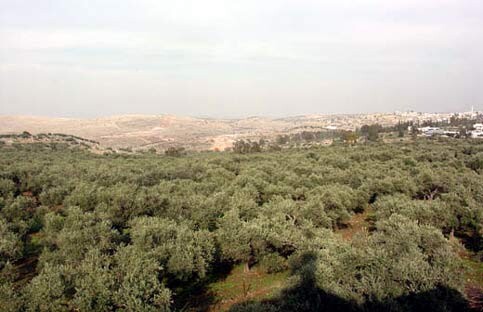World Food Programme 11 February 2004

The olive groves of Budrus before the Occupation bulldozers invaded the land on 30 December 2003. The groves were bulldozed. (StopTheWall.org)
ROME - In an effort to address the dire socioeconomic conditions in the Palestinian Territories, the United Nations World Food Programme — in collaboration with the Palestinian Ministry of Agriculture — will purchase 416 MT of olive oil, at a value of US$1.3 million, from 2600 selected poor Palestinian farmers.
The agency will then deliver the locally purchased olive oil to WFP beneficiaries living in Gaza and in the south of the West Bank who have limited access to oil due to its high cost and unavailability in markets.
“Many Palestinian farmers rely heavily on olive production for their livelihoods,” said Jean-Luc Siblot, WFP’s Country Director in the Territories. “By purchasing the oil directly from the farmers, we are able to assist the most vulnerable in the Palestinian Territories while simultaneously helping the local economy of the West Bank.”
Curfews and border closures, including restrictions on road access and movement within the West Bank, have had a serious impact on the economy of the Territories; farmers often face difficulties tending their olive groves and selling the oil produced.
A similar purchase of oil by WFP last year enabled farmers to cover the costs of maintaining the olive groves, thereby securing this year’s crop and improving the livelihood of farm households. The project has made it possible for participating households to be financially self-sufficient under very difficult circumstances.
“We are very grateful to the European Commission, through EuropeAid and ECHO, and to USAID for their generous contributions** which help make this project possible,” said Siblot.
WFP aims to provide food aid to 530,000 Palestinians impoverished due to deteriorating security and economic conditions.In the past six months, the UN food aid agency has transported and distributed 24,000 metric tons of food, including wheat flour, sugar, vegetable oil and lentils.
(**Recent donations: ECHO: US$ 207,000; EC (EuropeAid): $978,000; USAID: $162,000)
WFP is the world’s largest humanitarian agency. In 2003 WFP fed nearly 110 million people in 82 countries including most of the world’s refugees and internally displaced people.
WFP Global School Feeding Campaign — As the largest provider of nutritious meals to poor school children, WFP has launched a global campaign aimed at ensuring the world’s 300 million undernourished children are educated.